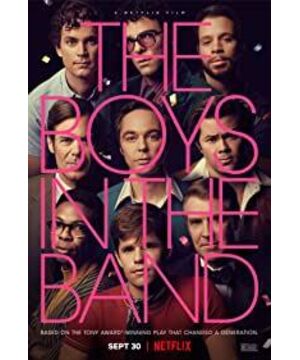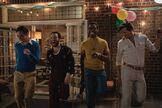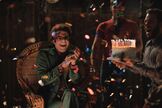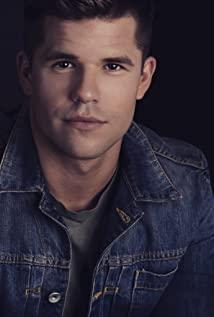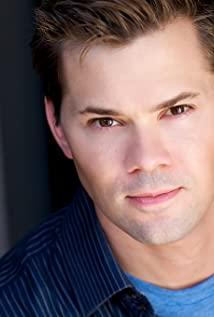(The old article is reissued, and the comparison between the new and the old version of the movie has been added)
All being mean to others is aversion to self, and subconscious rejection of this aversion to gain inner peace and self-esteem.
Nine characters and nine personalities can't get around a common motif: the self-identity of comrades. Different personalities are just different manifestations of the same problem.
Although the plot development seems a bit abrupt (for example, if you don't understand how Michael went crazy), the overall character is still very three-dimensional. All characters can be roughly divided into three groups. The first group of Hank, Donald, Larry, self-esteem, self-confidence, self-acceptance, wisdom and peace, the difference between the three of them lies in their different attitudes towards emotion and sex. Hank and Larry are two extremes, one pursues exclusive loyalty and the other enjoys The fun of sex with different people, the two have conflicts, and they can also find a wise solution; and Donald seems to be in the middle, not exclusive of Bath's love at first sight with Larry, but can also keep the affectionate heart.
The second group, Cowboy, Emory, Bernard, are all at the marginal bottom of gay, a cowboy and silly boy from the countryside who knows nothing and can’t recognize their own ignorance; an extremely feminine drama queen, very sensitive. I have to earn a bit, but I still have no self-esteem. Although an intellectual but helplessly a black, he silently endures the exclusion.
The third group of Allan, Michael, and Harold, are all subconscious contradictions that deeply disagree with themselves, and they are also the few people who have produced the most in Drama. Allan is more controversial, and it is clearly stated in the play that it did not tell us why Allan was crying to Michael in the beginning. One interpretation is the deep cabinet, and the other interpretation is that the straight man and his wife are emotionally uncomfortable; privately think it should be deep cabinet, or else Why he hesitated to come back and forth to find Michael, and Michael also saw at a glance that he did not want to leave the party, and called his wife the scene, basically is the most instinctive cover-up of the pseudo-straight man under great pressure, maybe Michael will not do it. Pressing Allan will come out on the contrary; Allan's disagreement with the self has reached the level of practicing language and writing and can't speak it. He can only wander in the brain subconsciously, even the self consciousness is suppressed and cannot be formed. Michael reached a reconciliation with himself in behavior and appearance, but he still felt inferior in his subconscious mind and needed to win the respect of others; so at the beginning Allan was always very cautious when he wanted to come. , But at the end, I didn’t clearly point out whether I had a crush on Allan or an inferiority complex), so I kept spitting irony, buying and changing clothes, until finally broke out hysterical meanness, as if to treat everyone and himself. It is very clear, in fact, it is just not self-confidence in oneself. Harold, on the other hand, feels that he has reached a peculiar state of being able to get along with self-loathing. He acts like Michael and reaches a reconciliation with himself externally. Unlike Michael, he can accept his own inferiority and self-loathing calmly and be content with it. Le, the first act of the first act is full of washbasin and skin care products and soapy feet protruding from the bathtub is Harold; it looks like a copper wall and an iron wall, and any attitude of others to oneself can be jokingly resisted, but how can this be? It is not a self-woven protective net. Although you can protect yourself from harm, it is difficult to truly communicate with others and have common emotions, and it is difficult to truly love yourself and your loved ones.
As for why it is called "Band Boys", it is because the "band" here refers to the "band" bands that were common in the 1960s when the script was formed and used to pair singers with harmony instrumental music. This kind of band is often hidden from the background and is not the protagonist. It also implies The protagonists of the script, the gay boys, are hidden behind the mainstream of society. This is also consistent with the matrix self-identification at the core of the script: it is precisely because of this marginalization and non-mainstream that various problems have been caused.
Compared with the old version of the movie, the overall feeling of the new movie is not strong enough. Although both clothing and photography are obviously more refined, I feel that the actor’s performance is not strong enough. I feel that the emotion is the same as that of a movie actor and is superficial, but it is not the dramatic self-identification and disapproval deep in the bones of the bone. The feelings of several characters are also slightly different: in the new version, Michael’s emotional transitions and waves seem to be even more illogical, Harold’s coldness and playfulness are more contrived, Allan has less hesitation and inner struggle, and Larry is more modern. More sophisticated and bitchy, Emory is less sensitive and inferior but more confident.
The picture of the album at the beginning of the new edition is exquisite, but it is only on the surface. The messy skin care products in the bathroom and the only visible leg in the bathtub in the beginning of the old edition, although not exquisite, they put Harold’s ugliness, low self-esteem, but The playful attitude implies it. The display at the end is very good for everyone, there is no abrupt end to the old version, but there is a long aftertaste. A scene of memories is added in the middle of the film, and the scale is good.
The supporting documentary is also available for viewing. Although I feel a little whitewashing (it’s just positive saying that the original actors are brave to star, but it doesn’t mention that many actors suffer from all sorts of things because of starring in the original version. I think this is a good opportunity to tell the truth about half a century ago. The social status of the play, and the epoch-making significance of the play in the context of the time), but it still roughly explains the history of some plays. At the end, the photos of each actor when he was young are also qualified Easter eggs.
View more about The Boys in the Band reviews


